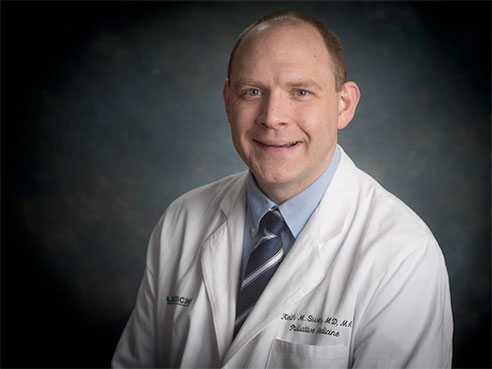 Keith M. Swetz, M.D., is nationally known for his clinical skill, especially in caring for patients with advanced heart failure. The University of Alabama at Birmingham School of Medicine Division of Gerontology, Geriatrics and Palliative Care associate professor has been awarded one of the 2016 Hastings Center Cunniff-Dixon Physician Awards in the early-career category.
Keith M. Swetz, M.D., is nationally known for his clinical skill, especially in caring for patients with advanced heart failure. The University of Alabama at Birmingham School of Medicine Division of Gerontology, Geriatrics and Palliative Care associate professor has been awarded one of the 2016 Hastings Center Cunniff-Dixon Physician Awards in the early-career category.
“Now in the seventh year of our collaboration with the Cunniff-Dixon Foundation, The Hastings Center is prouder than ever to be working together to honor these physicians,” said Mildred Z. Solomon, Ed.D., president of The Hastings Center. “They possess an uncommon combination of bedside and organizational skills that is transforming the experience of dying in America.”
Swetz, section chief in Palliative Care at the Birmingham VA Medical Center, earned a reputation locally as the “go-to guy” for hospice and palliative care, according to Marie Bakitas, DNSc, NP-C, FAAN, professor in the UAB School of Nursing and associate director of the UAB Center for Palliative and Supportive Care. He is one of five physicians being honored by The Hastings Center Cunniff-Dixon Physician Awards, including Marian Hodges, M.D., from Providence Health & Services in Portland, Ore.; Paul Tatum III, M.D., from University of Missouri-Columbia; Ross Alber, M.D., Ph.D., from Hartford HealthCare in Hartford, Conn.; and Rashmi Sharma, M.D., from University of Washington in Seattle.
The awards were made in three categories: a senior award and a mid-career award of $25,000 each and three early-career awards of $15,000 apiece. Each recipient has been exemplary in one or more of four areas: medical practice, teaching, research and community.
The Cunniff-Dixon Foundation, whose mission is to enrich the doctor-patient relationship near the end of life, funds the awards. The Hastings Center, a bioethics research institute that has done groundbreaking work on end-of-life decision-making, co-sponsors the awards. Duke University Divinity School’s Program in Medicine, Theology and Culture oversees the selection process.